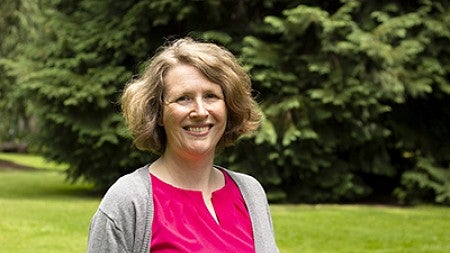
Global Studies Institute
ellyvan@uoregon.edu | 541-346-6086
Courses: BI 140 Science, Policy, and Biology, BI/CH/GEOL/PHYS 407/507 Seminar: Teaching Science, HC 441H Bread 101, HIST 211: Reacting to the Past, STEM in London Study Abroad
In my classes you will:
- Make connections to our lived experiences and real-world challenges.
- Learn with and from peers.
I was invited into the Teaching Academy because:
- I am a Herman Award Recipient.
- I am a Williams Fellow.
- I was a member of the Working Group on Inclusive and Intercultural Teaching.
- I participated in a Summer Institute on Scientific Teaching.
- I was a Fellow in the Teaching High-Challenge Gateway Courses CAIT Group.
In what ways are you working to make your teaching inclusive?
I design classroom experiences that are interesting, engaging, and relevant using teaching practices shown to improve inclusive learning environments. For example, students complete Scientist Spotlights to learn about a diversity of scientists who conduct research related to course content (Schinske, et al., 2016). Students also participate in Reacting to the Past games by taking on roles of historical people engaged in scientific controversy (Carnes, 2014). Through these learning activities students experience different perspectives, develop shared community, and reflect on their own learning.
What do you do in terms of professional engagement with the teaching and learning culture on campus or nationally?
I am the director of the Global Studies Institute within the Division of Global Engagement. Previously I was the Program Director, Global STEM Education Initiatives and Senior Instructor II in the Global Studies Institute and led the Science Literacy Program. I am a national leader for the National Institute on Scientific Teaching and have organized five Summer Institutes on Scientific Teaching at the UO; co-PI on a NSF RCN-UBE grant: Networking STEM Initiatives to Enhance (NSITE) Adoption of Evidence-Based Practices; and coordinated the UO partnership with the Alan Alda Center for Communicating Science.
In what ways was your teaching in this course research-led—informed by research on how students learn and inflected by UO's research mission?
My courses are designed using the principles of Scientific Teaching (Handelsman, et al., 2007) where all elements of the course are designed to be inclusive, include assessments and activities that are aligned through backward design to course goals and student learning objectives, and harnesses cognitive science literature to support how people learn (National Academies, 2018).
